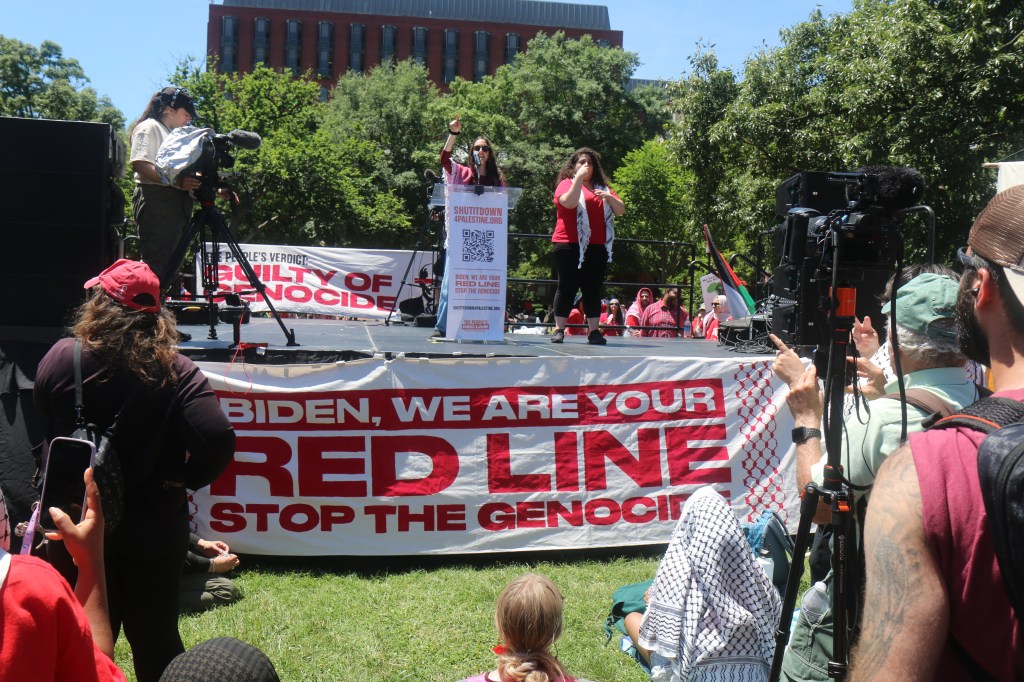I watched as thousands encircled the White House on June 8 to protest President Biden’s support for Israel — in particular, his refusal to identify IDF incursions into Rafah as the invasion he said would be a “red line.”
Layan Fuleihan addressed a crowd from a stage nearby: “Biden refuses to draw the line, so we are going to draw the line.”
Two weeks earlier, I saw Fuleihan in Detroit, at the People’s Conference for Palestine, where she moderated a panel discussion that critiqued the U.S.-Israel relationship as rooted in U.S. imperialism and its desire for global dominance.
The conference and D.C. protest gave indications — and full-throated pronouncements — of where the protest movement is headed now that many college encampments have been dismantled as students left for the summer break.
Couched in an assessment of U.S. support for Israel as an imperial alliance disguised as a moral imperative, activists are focusing on organizing locally as well as strengthening connections with like-minded coalitions in different sectors of American society and other countries.
One new initiative is aimed at publicizing “silent partners in the weapons trade,” logistics companies that ship weapons the Israeli military uses in Gaza, according to Nadya Tannous, a member of the Palestinian Youth Movement.
She’s a national leader of a campaign to target the Danish shipping giant Maersk, which activists say has transported more than $300 million of weapons components to the U.S. since October, where arms manufacturers like Northrop Grumman, Raytheon and Lockheed Martin assemble them before they’re transferred to Israel.
“We’re demanding that Maersk cut ties with genocide, so end the transportation of arms and arms components, cut all contracts that fuel genocide, and we’re demanding an arms embargo now,” Tannous said.
The strategy is intended to disrupt the supply chain through coordination with sympathetic groups like dockworkers, she said. San Francisco-based Local 10 of the International Longshoreman Workers Union (ILWU) passed a May 1 boycott resolution. The union’s national leadership followed suit, voting to refuse to handle U.S. military cargo destined for Israel. But that doesn’t apply to Maersk’s private ships, so activists are highlighting how it also moves arms and components.
Another goal is to stamp the company’s brand with its role in supplying arms, Tannous said, creating a historical record to ensure accountability if Maersk and companies like it try to distance themselves from a conflict activists expect will be recognized as a genocide in the years to come.
While summer interrupted the student movement, Tannous said young people aren’t giving up. News outlets were moving away from covering Palestine, she said, but the encampments didn’t let them. Students’ commitment to the issue is part of a broader disdain for an aging leadership that young people see as unresponsive to urgent crises.
“The new generation is fed up at the antics of the old guard. Whether that be their exacerbated move towards a climate catastrophe, whether that be endless war, they’re sick of it,” Tannous said.
Young people’s perspectives on the conflict are informed by direct reports from Gaza and conversations happening around the world on social media that aren’t reflected in mainstream coverage, she explained.
“The older generation is really strapped to articles from The New York Times, from Washington Post, from HuffPost,” institutions that provide analysis of the politics of Israel/Palestine that often mirrors that of Fox News, Tannous said. It makes young people question the information they get from traditional outlets and gravitate toward sources that provide more details and context.
Pro-Israel groups like AIPAC and the Anti-Defamation League are struggling to counter the shift because “Zionism has really aligned itself with the interests of the upper class and also white community” in the U.S., Tannous said. They haven’t been organizing with people of color, working-class communities, immigrants, refugees, “or with groups who are perceived as not having much power, like young people.”
Meanwhile, groups like Students for Justice in Palestine have. Many students will return to campuses that have an SJP chapter, and despite “terror-washing” attempts to paint it and organizations like Jewish Voice for Peace as supporting Hamas terrorism (an accusation also leveled by an Israeli lawmaker last week against Israelis protesting Prime Minister Benjamin Netanyahu), according to Tannous, those groups’ memberships and activities are expanding.
“And so they’re actually getting something that the previous generations of college students in this country did not, which is a positive narrative and actually well-researched, cohesive information about Palestinian people and about the cause for Palestine,” Tannous said.
Danney is a journalist based in Brooklyn.
